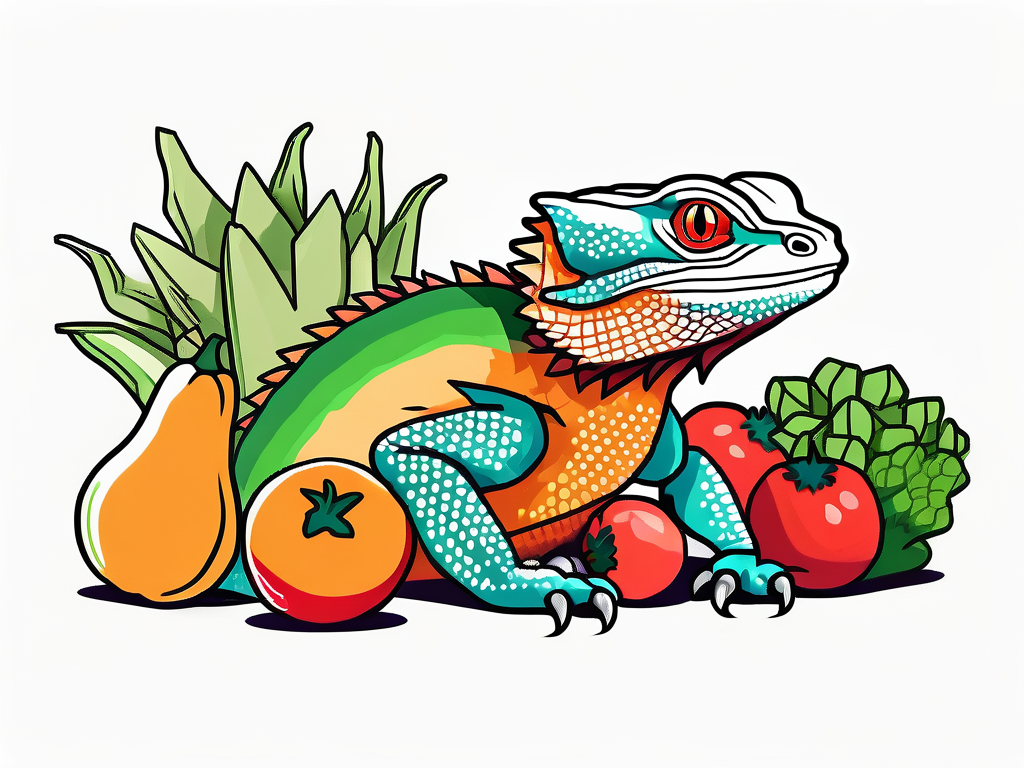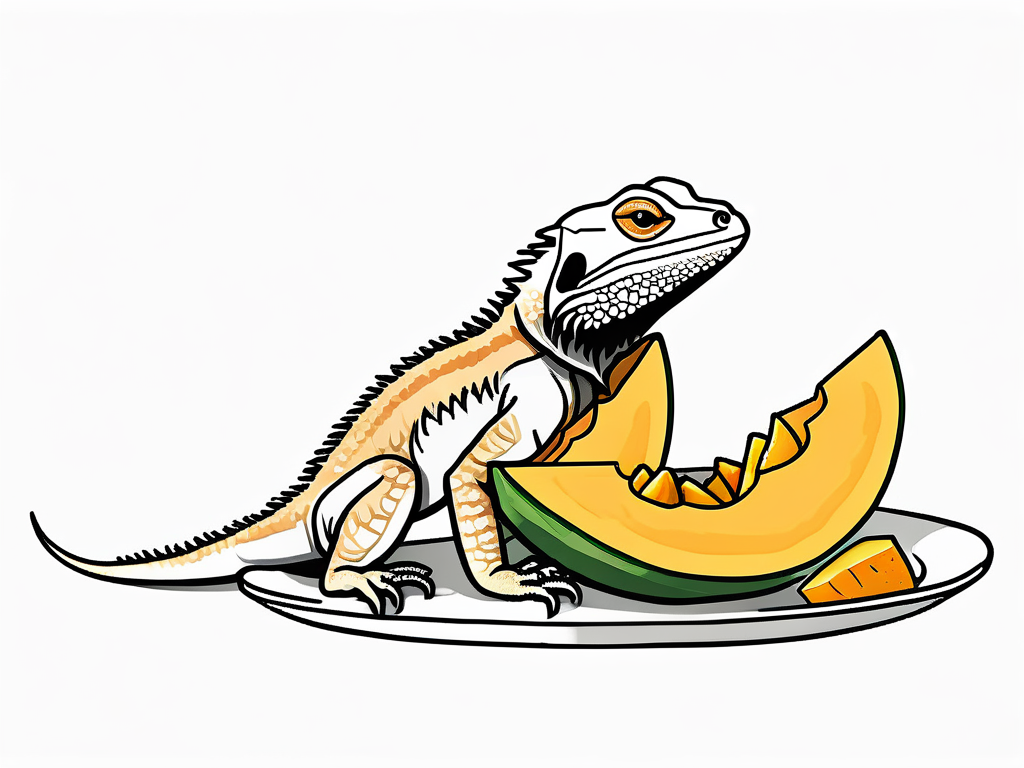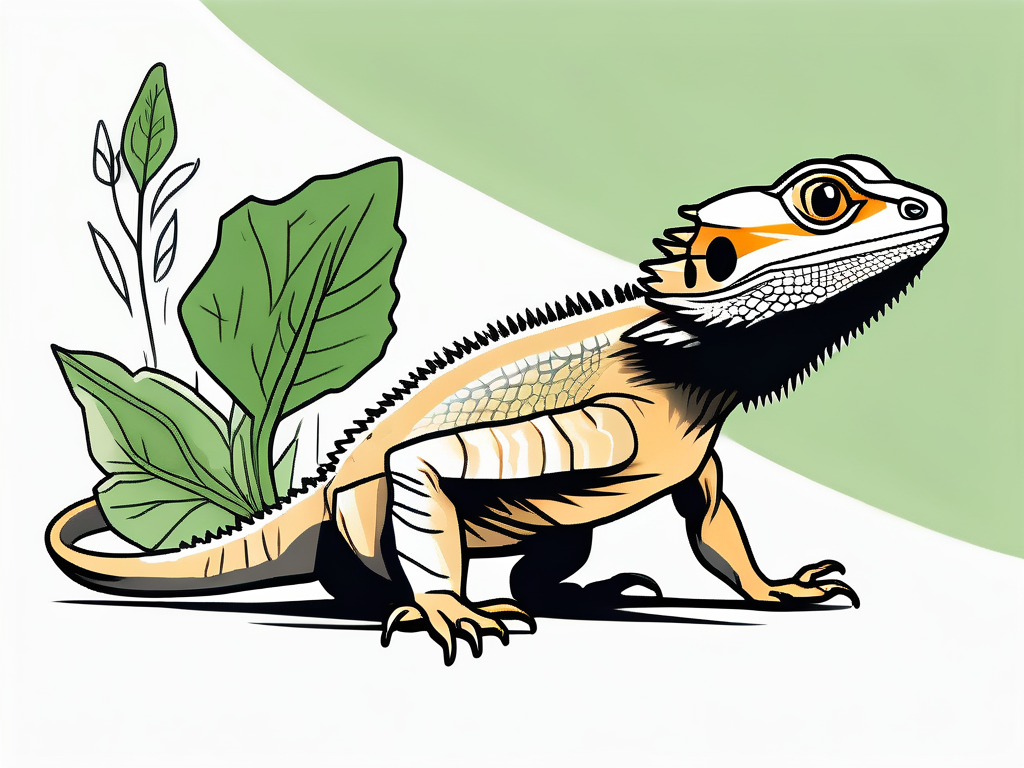There is a growing trend among reptile owners to offer a diverse diet to their pets. After all, the nutritional needs of these animals vary greatly from our own. One particular discussion revolves around the consumption of mangos by bearded dragons. Mangos are delicious, juicy, and nutritious fruits enjoyed by many people worldwide. But are they suitable for our scaly companions? In this article, we will delve into the diet of bearded dragons, explore the role of fruits in their nutrition, take a detailed look at mangos, and discuss how to safely incorporate them into their diet.
Understanding the Diet of Bearded Dragons
Before we tackle the topic of mangos, it is crucial to understand the dietary requirements of bearded dragons. These captivating reptiles are omnivores, which means they consume both animal-based and plant-based foods. Their diet should consist of a well-balanced mix of proteins, vegetables, and fruits.

Bearded dragons are fascinating creatures that require a diverse diet to stay healthy and vibrant. In the wild, they feed on a variety of insects, vegetation, and even the occasional fruit. Mimicking this diverse diet in captivity is essential for their overall well-being.
The Nutritional Needs of Bearded Dragons
A proper diet ensures that bearded dragons receive all the essential nutrients they require for growth, development, and overall well-being. These reptiles need a combination of calcium, protein, vitamins, and minerals to thrive. Without a sufficient intake of these nutrients, they may experience health issues, such as metabolic bone disease.
It’s crucial to provide a balanced diet that meets all the nutritional needs of bearded dragons. Calcium is particularly important for their bone health, while protein helps with muscle development. Vitamins and minerals play a vital role in various bodily functions, ensuring that these reptiles lead a healthy and active life.
Common Foods in a Bearded Dragon’s Diet
The staple diet of bearded dragons typically consists of insects, such as crickets, roaches, and mealworms, and leafy green vegetables like collard greens and kale. These foods provide the necessary protein, calcium, and fiber essential for their health.
Offering a variety of food options is key to keeping your bearded dragon engaged and healthy. In addition to insects and greens, occasional treats like fruits can be included in their diet. However, it’s essential to ensure that fruits are given in moderation, as some fruits can be high in sugar and may lead to health issues if overfed.
The Role of Fruits in a Bearded Dragon’s Diet
While fruits are not a primary component of a bearded dragon’s diet, they can offer additional nutrients and variety. Fruits are a great source of hydration, vitamins, and natural sugars, which can be beneficial when provided in moderation.
Bearded dragons, like many reptiles, have specific dietary requirements that need to be met for optimal health. While their main diet consists of insects and leafy greens, incorporating fruits can add a nutritional boost. It’s important to remember that not all fruits are suitable for bearded dragons, so careful selection is key.
Benefits of Fruits for Bearded Dragons
Fruits provide bearded dragons with a variety of essential vitamins, minerals, and phytonutrients. They can contribute to a well-rounded diet and help meet the reptile’s daily hydration needs. Additionally, fruits provide natural sugars that can be readily absorbed for energy.
Some fruits that are commonly recommended for bearded dragons include papaya, berries, and mango. These fruits are not only rich in vitamins and minerals but also have a good water content, aiding in hydration. Offering a diverse range of fruits can prevent dietary deficiencies and keep your bearded dragon healthy and happy.
Potential Risks of Fruits for Bearded Dragons
While fruits offer benefits, they can also present some risks when fed excessively or inappropriate types are chosen. The high sugar content in some fruits can lead to obesity and related health issues in bearded dragons. It is vital to strike a balance and select fruits with moderation.
Furthermore, some fruits contain compounds that may be harmful to bearded dragons if consumed in large quantities. For example, citrus fruits like oranges and lemons can be too acidic for their digestive systems. Always research and consult with a reptile veterinarian before introducing new fruits into your bearded dragon’s diet to ensure their well-being.
Mangos and Bearded Dragons: A Detailed Look
With our understanding of bearded dragon diets and the role of fruits, let’s explore the specific characteristics of mangos and their potential impact on these reptiles.
Bearded dragons, known for their omnivorous diets, can benefit from a variety of fruits in moderation. Mangos, a tropical fruit prized for their sweet, juicy flesh, offer a range of nutrients that can complement a bearded dragon’s diet.
Nutritional Content of Mangos
Mangos are a tropical fruit known for their sweet, juicy flesh. They are rich in vitamins A, C, E, and K. Additionally, mangos are a good source of dietary fiber.
Vitamin A, found abundantly in mangos, plays a crucial role in maintaining healthy vision and supporting immune function in bearded dragons. Vitamin C aids in boosting their immune system, while vitamin E acts as an antioxidant, protecting cells from damage. Vitamin K is essential for blood clotting and bone health, contributing to the overall well-being of these reptiles.
Potential Benefits of Mangos for Bearded Dragons
When offered in moderation, mangos can provide bearded dragons with additional vitamins and fiber. The vitamin A content in mangos is essential for maintaining healthy vision and proper immune function. The fiber content helps support digestion in these reptiles.
Furthermore, the natural sugars in mangos can offer a quick source of energy for bearded dragons, especially during periods of increased activity or growth. The hydration provided by the juicy fruit can also contribute to their overall well-being.
Potential Risks of Mangos for Bearded Dragons
Although mangos have nutritional benefits, they also contain a relatively high amount of sugar. Excess sugar intake can lead to weight gain and other health issues, including metabolic disorders and dental problems. As with any fruit, mangos should be offered sparingly.
It’s important to monitor the quantity of mango offered to your bearded dragon to prevent overconsumption of sugar. Balancing their diet with a variety of fruits, vegetables, and protein sources is key to ensuring their nutritional needs are met without compromising their health.
How to Safely Feed Mangos to Your Bearded Dragon
If you decide to offer mangos to your bearded dragon, it is essential to do so in a safe and appropriate manner. Bearded dragons are omnivores and can enjoy a variety of fruits as part of their diet, including mangos. However, it’s important to follow proper guidelines to ensure the health and well-being of your scaly friend.

Mangos are a delicious and nutritious treat for bearded dragons, providing essential vitamins and minerals. When introducing new foods like mangos to your bearded dragon, it’s crucial to monitor their reaction and digestion to ensure they tolerate it well.
Preparing Mangos for Your Bearded Dragon
Prior to feeding mangos to your bearded dragon, it is crucial to prepare them correctly. Remove the skin and pit, as these parts can be difficult to digest for reptiles. Cut the mango into small, bite-sized pieces to prevent choking hazards. Bearded dragons have small mouths, so cutting the mango into manageable pieces will make it easier for them to eat and digest.
It’s also recommended to wash the mango thoroughly to remove any pesticides or chemicals that may be present on the skin. Organic mangos are a great choice to ensure your bearded dragon is not exposed to harmful substances.
Determining the Right Serving Size
The serving size of mangos for a bearded dragon depends on its size, age, and overall diet. As a general rule, fruits should only comprise about 10% of a bearded dragon’s dietary intake. Offer mangos as an occasional treat, not as a primary food source. Monitoring your bearded dragon’s weight and overall health is essential when introducing new foods to their diet.
Remember, variety is key when it comes to feeding your bearded dragon. Along with mangos, you can offer a range of fruits and vegetables to ensure they receive a well-rounded and balanced diet. Consulting with a reptile veterinarian or a knowledgeable exotic pet specialist can provide you with additional guidance on feeding mangos and other foods to your beloved bearded dragon.
Alternatives to Mangos in a Bearded Dragon’s Diet
If you are hesitant about feeding your bearded dragon mangos or want to provide more variety, several alternative fruits can be safely incorporated into their diet.

Bearded dragons are omnivores and enjoy a diverse diet that includes a variety of fruits. In addition to mangos, there are other safe and nutritious options to consider. These alternatives not only provide essential vitamins and minerals but also add excitement to your pet’s mealtime.
Other Safe Fruits for Bearded Dragons
Safe fruits for bearded dragons include strawberries, blueberries, raspberries, apples, and pears. These fruits can offer similar nutritional benefits to mangos without the high sugar content. Remember to introduce new fruits slowly and monitor your dragon’s response to ensure compatibility.
Strawberries are a great source of vitamin C and antioxidants, while blueberries are packed with beneficial nutrients like fiber and vitamin K. Raspberries provide a tasty treat rich in manganese and vitamin C. Apples and pears offer a crunchy texture that can help with your dragon’s jaw strength and provide essential vitamins and minerals.
Balancing Fruits with Other Dietary Needs
Remember that a bearded dragon’s diet should consist primarily of proteins and vegetables. While fruits can be a valuable addition, they should not replace the essential components of their diet. Ensure a well-balanced mix of proteins, leafy greens, and safe fruits to provide optimal nutrition for your scaly friend.
Proteins can be sourced from insects like crickets, mealworms, and dubia roaches, while dark leafy greens such as collard greens, mustard greens, and dandelion greens are excellent vegetable options. These foods are essential for your bearded dragon’s growth, development, and overall health.
In conclusion, bearded dragons can eat mangos, but they should be offered in moderation and as part of a balanced diet. Mangos can provide beneficial nutrients, such as vitamins and fiber, but their sugar content should be carefully considered. By understanding their nutritional needs, proper preparation, and appropriate serving size, you can safely incorporate mangos or other fruits into your bearded dragon’s diet for added variety and nutrition.
